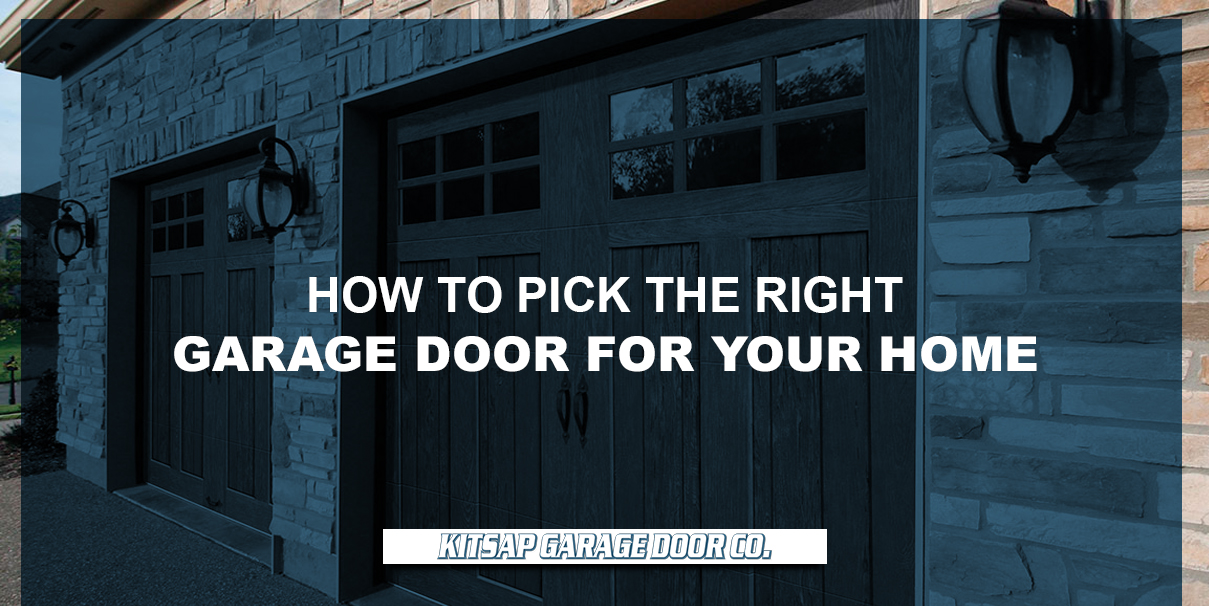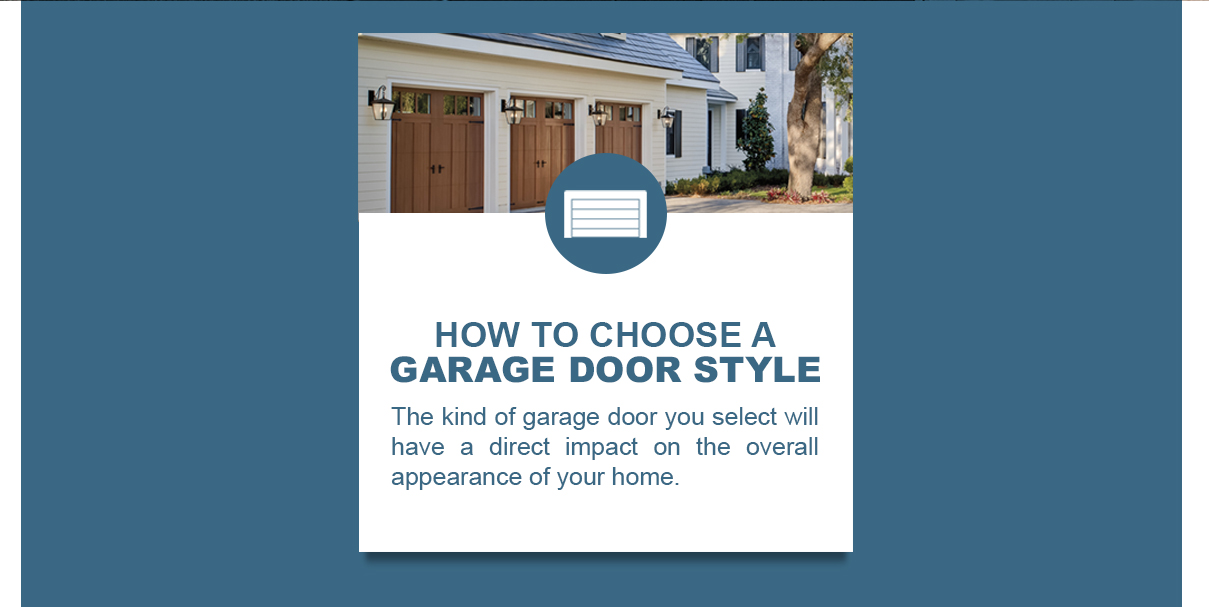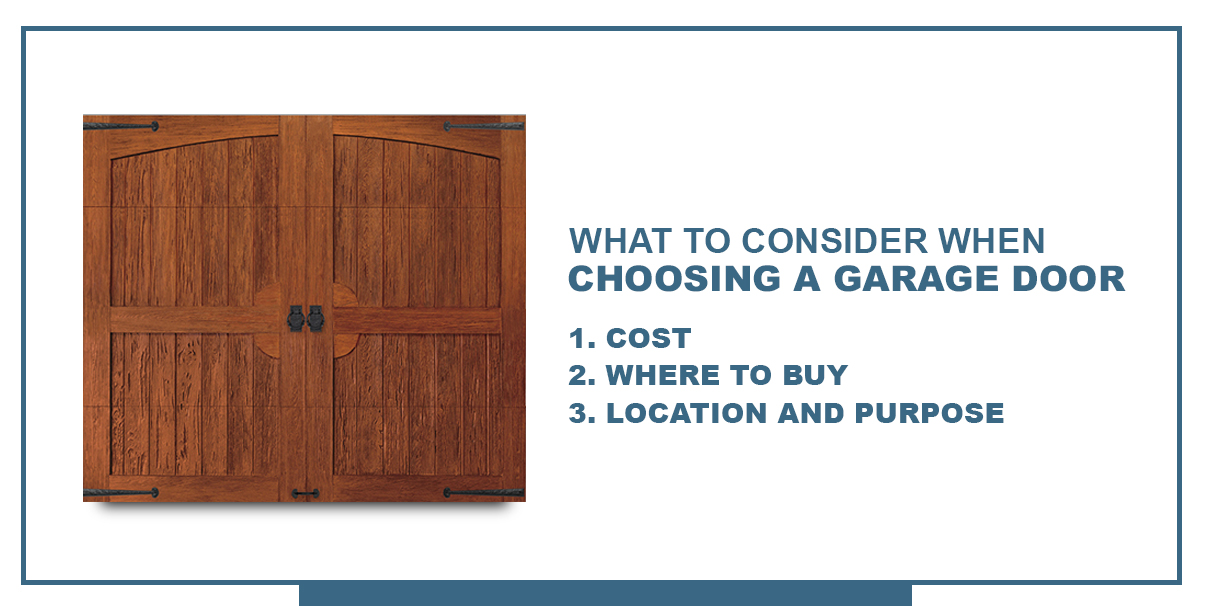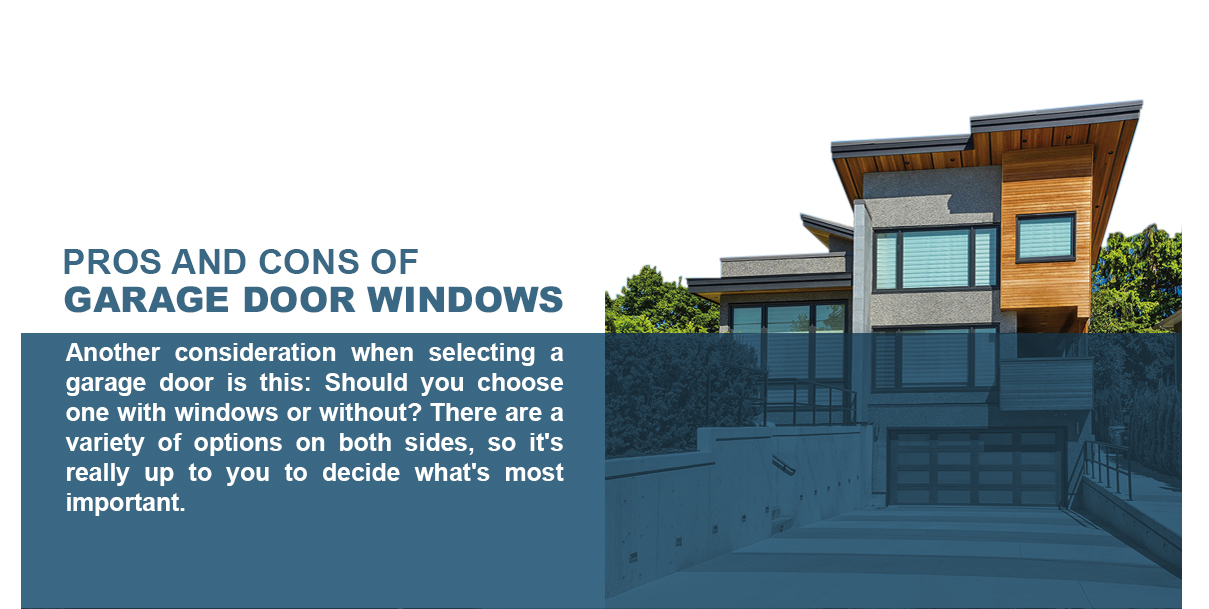How to Pick the Right Garage Door in Kitsap, WA

When it comes time to buy a new garage door, most people have no clue where to start. After all, it’s not exactly an item you buy often. Odds are, you may never have purchased a garage door before. However, don’t let your lack of experience stop you from choosing a fabulous new door that complements — or even improves — the curb appeal of your home.
While it may seem like a fairly basic home improvement project, the truth is that replacing your garage door increases the value of your home, and it is one of the few home improvement projects that offer owners a huge return on investment (ROI). In fact, depending on the market where you live, you can expect to get between an 85 and 110 percent ROI on your garage door when you sell your home.

How to Choose a Garage Door Style
The kind of garage door you select will have a direct impact on the overall appearance of your home. That’s why the essential thing to remember when picking a style of garage door is to choose one that complements the style of your home.
Explore Our EZDoor Design Tool
What does this mean? Basically, you need to select a door that’s in keeping with the overall look of your home. For example, if you live in a modern home, you’ll want to select a contemporary garage door with simple lines and design that’s free of ornamentation. This style will highlight your home’s clean, streamlined look nicely. Or, if you live in a Craftsman-style home, which is known for extensive woodwork, overhanging eaves and divided-light windows, you might select a garage door that features some of the same types of details.
In short, the garage door you choose should make your home look better by blending in with the existing design. Your goal is to select a style that complements your home’s appearance, rather than competing with it. We’ll get into more detail about this later, so keep reading!
What to Consider When Choosing a Garage Door
Choosing the right garage door style is certainly a huge consideration when it comes to your purchase, but before you can pick one, there are several things you need to determine first.

1. Cost
The average cost of a garage door is going to vary widely. What you spend will depend on what kind of door you choose — the material it’s made from — as well as who installs it, since installation fees themselves may also vary. If you’re going to need a new garage door opener to accompany it, you’ll want to budget additional money for that as well.
Initially, the costs associated with purchasing a new garage door may seem overwhelming. The average garage door and installation totals more than $3,300. But before you panic, consider this: A new garage door can increase your home’s value by more than $2,800 — that’s most of what you spent in the first place. In fact, on average, homeowners find they receive about 85 percent return on investment with a new garage door. And, one survey even found some homeowners reported an ROI as high as 110 percent. It all depends on your location.
Now THAT’S a good investment!
2. Where to Buy
There are plenty of places that sell garage doors, including all the standard big-box home improvement stores. You can visit their websites to browse their offerings, as well as request information about their installation. They typically offer financing, which is helpful, since they will often require full payment in advance of installation. The downside to these retailers is that they do not offer a showroom where you can go touch and see the doors in person. When you’re making a big investment like a garage door, this can be a difficult way to shop.
Many people prefer to work with a local independent company that specializes in garage door sales and installation. Some local companies even offer custom doors. Depending on the company, they may have committed to selling only one brand of garage door, or they may sell several brands. If you’re interested in a specific brand of door, it may be beneficial to do some research to find out which companies in your area are licensed distributors of that particular brand or product.
If you opt to work with an independent company, it’s important to research their reputation and reliability. Do you know someone who has worked with them in the past? Were they pleased by their work? You may also want to do a bit of homework about the brands they sell to find out how they differ and which may be the best for you. That is why it can be so helpful to work with a company that has a staffed showroom. Often, these companies will also come out to your home to help you confirm which door will be best for you.
3. Location and Purpose
Considering your home’s location is essential to selecting the right garage door. If you live in a place that tends to get a lot of rain or snow, your door will be more exposed to weather and the elements, which means you need a door that won’t wear down easily. If you live in a place that tends to get very cold, you might want to select an insulated door that will keep the cold temperatures at bay, particularly if your garage doubles as a workshop or has a bonus room over it — but more about that later.
Garage Door Materials
Garage doors come in a variety of different materials. Which material you choose will depend on all the factors we mentioned before — budget, location and style of your home. One other big consideration when it comes to the material you select for your garage door is maintenance. Some materials, such as wood, require a lot of work to keep their surface clean and the wood free from damage. Others, such as vinyl, only need an occasional wash.
When it comes to maintenance, it’s also essential to consider the location of the door. For example, if your garage door sits directly underneath a basketball hoop, you may not want to select a steel or aluminum door because these materials are prone to dents and probably would not hold up well against an intense game of one-on-one. Here is a closer look at the types of garage door materials.
1. Wood or Wood Composite
Pros: Looks elegant, aesthetically pleasing, wears well
Cons: Prone to cracking or warping, requires frequent refinishing, more vulnerable to the elements, doesn’t last as long as doors made from other materials, can be expensive
2. Vinyl
Pros: Durable, easy to clean, dent- and rust-proof
Cons: Limited variety of colors and designs available
3. Steel
Pros: Low-maintenance, affordable, stronger than traditional wood doors, easy to paint to look like wood, stands up well to weather, doesn’t warp or crack
Cons: Prone to rust and dents unless cased in fiberglass, difficult to repair, varies in quality depending on the thickness and weatherstripping
4. Fiberglass
Pros: Affordable, easy to customize, mimics other materials at a more affordable price, holds up well in coastal areas, lightweight
Cons: Poor insulator, yellows over time, prone to breakage over time in colder climates
5. Aluminum
Pros: Lightweight, laminated panels are dent-resistant
Cons: Vary in costs — the cheaper ones are easy to damage
Aesthetics and Curb Appeal
Have you ever driven by a home with a hideous garage door? Maybe it was painted an odd color, or perhaps it looked out of place with the design of the house. Or, it might not have held up well to the elements, and it was sagging, dented and warped.
It should go without saying, but the appearance of your garage door is vital — not only when you first buy it, but as time goes on. That means you want to select a door that will look good now and for years to come, so the style of your garage door should mirror the style of your house. In general, there are four main types of garage door styles to choose from.
1. 1950s Ranch
This type of door is probably the first thing you picture when you hear “garage door.” It is a basic, horizontal-paneled design. It often does not have windows, although homeowners can incorporate windows and other decorative hardware with them to personalize them.
2. Edwardian
These doors contain windows, and you’ll usually select them to match the windows you already have in your home. The windows may be arched or divided-light. Edwardian-style doors will look a little more traditional or “old-fashioned,” but don’t let that description fool you. They can provide an elegant, old-world feel to complement a more traditional-looking home.
3. Victorian
The easiest way to describe a Victorian-style garage door is to think of a garage door with a coach house or stable-type look. They may include decorative hardware, like handles or iron hinges. They might have a paneled wood look, achieved either by installing real or faux wood doors. They will also typically have divided-light windows that coordinate with the existing windows in your home.
4. Contemporary
These modern-styled garage doors are bigger and bolder, giving homeowners a unique way to make a statement. Featuring clean lines and a simple design that adds a unique element to your home, owners can choose from a variety of details and materials to complement a more modern-looking exterior.

Pros and Cons of Garage Door Windows
Another consideration when selecting a garage door is this: Should you choose one with windows or without? There are a variety of options on both sides, so it’s really up to you to decide what’s most important.
Windows let in more natural light, making the garage brighter and easier to move around in. If you use your garage a lot, for parking or as a workshop, having the extra light is essential. It can also make a huge difference in your home’s curb appeal by adding unique and attractive details to your home’s exterior.
However, while natural light and beautiful details sound appealing, there is a downside to installing a door with windows as well. If you have windows in your garage door, they will allow warm and cool air to escape. Therefore, a door with windows is not quite as energy-efficient. It can also be a security risk because people will be able to see in. If you keep expensive tools or household goods inside your garage, people will be able to see them, and someone who is up to no good could feel enticed to break in and help themselves.
Do I Need an Insulated Garage Door?
One common consideration when shopping for a new garage door is insulation. These days, most homeowners are looking for ways to make their home — and their garage — more energy-efficient, and installing an insulated garage door seems to be one of the smartest ways to do this. While there is some research to suggest a properly insulated garage door can keep your home 10 to 20 degrees warmer in the winter, it doesn’t mean everyone should run out and buy an insulated garage door. Instead, consider three factors.
1. Location
If you live in a more extreme climate, particularly one with exceptionally cold winters, an insulated door may be of some benefit to you. If you live somewhere with more moderate temperatures, insulated garage doors may not make a significant impact on your home’s “thermal envelope,” and may not be worth the extra expense.
2. Floorplan
If your garage shares an interior wall with the rest of your home, or you have a bonus room over the garage, installing an insulated garage door may help shield your house from some of the cold air that would otherwise make its way through the door. If your garage is separate from your home and you don’t use it consistently, it may not be necessary to put the money into an insulated door.
3. Use of the Space
If you’re like most of today’s homeowners, you most likely use your garage as your primary point of entry and exit to your home. As a result, your garage door is probably going up and down several times a day. Every time this happens, you break your home’s thermal envelope, allowing a wall of cold air into your living space. Some people may decide it’s better to spend their money on improving the insulation in the shared wall between your house and the garage. However, if you have converted your garage into a living space or a workshop where the door does not go up and down frequently, investing in an insulated door may contribute significantly to the energy efficiency of the space and be well worth the investment.
If you do opt for an insulated garage door, make sure to do your homework. There are varying degrees of insulation capacity within doors, which manufacturers categorize using a measurement called an R-value. The higher a door’s listed R-value, the better it will do in insulating your home.

Let Kitsap Garage Door Help you
Even after doing research, you probably have a lot of questions. It’s time to find a company that can walk you through the rest of the process. Serving Bremerton, Wash., since 1975, Kitsap Garage Door is a family-owned and -operated business dedicated to helping you find the perfect garage door for your home. Our professionally staffed showroom features high-quality Clopay doors, providing you with a wide variety of options that will update and enhance your home and bring it to life again. As a licensed Clopay dealer, we are proud to offer a variety of their garage doors to fit all styles and budgets.
To transform the look of your home with a brand-new garage door, don’t wait. Contact us today!

